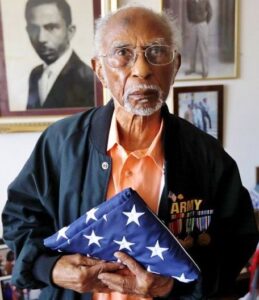 Denied admission to artillery officer candidate school because of his race, Waverly Woodson (photo, left), who died at age 83 in 2005, was trained to be a combat medic, given the rank of corporal, and landed with Omaha Beach’s third wave on D-Day.
Denied admission to artillery officer candidate school because of his race, Waverly Woodson (photo, left), who died at age 83 in 2005, was trained to be a combat medic, given the rank of corporal, and landed with Omaha Beach’s third wave on D-Day.
Woodson was wounded before getting ashore; a German shell hit his landing craft, and he took shrapnel in his groin, thigh, and back.
After receiving first aid once he was ashore, Woodson went to work as a medic, treating wounded soldiers for 30 straight hours (details here). He also saved three British soldiers from drowning.
Wikipedia says (here), “It has been estimated that Woodson’s actions during the Battle of Normandy saved the lives of as many as 200 soldiers, both black and white.”
Woodson’s commanding officer recommended him for a Distinguished Service Cross; farther up the chain of command, Lt. Gen. John C. H. Lee, whose attitudes on race were ahead of his (and the Army’s) time, recommended Woodson for the Medal of Honor. But he only got a Purple Heart, and a Bronze Star presented to his widow after his death (it was approved at the time, but the paperwork “got lost”).
African-Americans who served in World War 2 were ineligible for the Medal of Honor. Not one of the million or so blacks who served in the armed forces during that war received it. This wasn’t written anywhere; it was unofficial, unspoken, but rigidly enforced policy.
There are many precedents for belatedly awarding the Medal of Honor to overlooked heroes, although the process is complicated because Congress has to approve these awards.
In 1997, seven black World War 2 veterans, only 1 of them living, received the medal (details here); in 2005, Korean War hero Tibor Rubin, a victim of antisemitism, received it (details here); in 2014, Alonzo Cushing, a Gettysburg hero killed during Pickett’s charge, received it (details here); in 2017, James McCloughan (who is white), a Vietnam War medic, received it (details here); in 2021, it was presented to the widow of Alwyne Cashe, a black Iraq War hero (details here).
Bills to award Woodson the Medal of Honor were introduced in the House and Senate in 2020, but didn’t move forward. That effort should not be abandoned; legislators should persist with it. The nation hasn’t forgotten Woodson, and Congress shouldn’t either. His skin color is no reason to deny him the honors he earned on that bloody beach on D-Day.